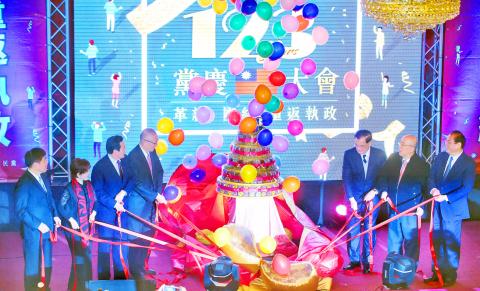Chinese Nationalist Party (KMT) heavyweights, lawmakers and supporters yesterday attended a packed ceremony in Taipei to commemorate the 123rd anniversary of the organization that eventually became the KMT, an event designed to boost party morale ahead of the nine-in-one elections next year.
The ceremony was held at the Taipei Hero House to mark the founding of the Society for Regenerating China (興中會), a revolutionary organization established by Republic of China founder Sun Yat-sen (孫逸仙) in Honolulu, Hawaii, on Nov. 24, 1894, with the aim of overthrowing the Qing Dynasty.
The society evolved into the KMT in 1919.

Photo: Liu Hsin-de, Taipei Times
At a time when the KMT is facing intraparty divisions and plummeting popularity, the ceremony revolved around the theme of “revolution, unity and regaining power.”
Incumbent and former KMT chairpeople attended the event, with the notable exception of New Taipei City Mayor Eric Chu (朱立倫).
In his opening speech KMT Chairman Wu Den-yih (吳敦義) said that the performance of the Democratic Progressive Party (DPP) administration pales in comparison with that of the previous KMT government, which he said facilitated rapprochement across the Taiwan Strait, boosted tourism and promoted warmer ties between Taiwan and its main allies.
“Not only has the DPP administration failed to maintain the peaceful and stable cross-strait foundation built [by the KMT], but it has also proposed many policies that are not beneficial, but rather harmful” to the nation, Wu added.
The former vice president cited as examples the fall in Chinese tourism numbers, delays in drafting complementary energy policies for the DPP administration’s plan to phase out nuclear energy by 2025, and labor amendments that are detrimental to both labor and management.
“The public has apparently missed the KMT,” Wu said, urging the party to endeavor to win as many seats as possible in next year’s nine-in-one elections to strengthen its grassroots influence ahead of the 2020 presidential race.
In a departure from remarks by other KMT heavyweights, who either took issue with the current administration or emphasized the party’s role in promoting closer cross-strait relations, former KMT chairwoman Hung Hsiu-chu (洪秀柱) reminded party members of the KMT’s ultimate goal of cross-strait unification.
“We must remember that the KMT is a party that once ruled the entire mainland... We also must not forget that the our lifelong goal of unification is stipulated in the Constitution, something we need to achieve step by step with a firm stance, a clear goal and a consistent direction,” Hung said.
Hung, the KMT’s first and only elected party chairwoman, lost her presidential candidacy to Chu in 2015 due to her unconcealed support for unification.
The KMT also sought to appeal to the younger generation by releasing a video featuring Wu and five other former KMT chairpeople joining young people in singing to a modified tune of the national flag song.
Former KMT chairman Wu Poh-hsiung (吳伯雄) said the party should focus more on young people and ignite their passion toward the party.

An essay competition jointly organized by a local writing society and a publisher affiliated with the Chinese Communist Party (CCP) might have contravened the Act Governing Relations Between the People of the Taiwan Area and the Mainland Area (臺灣地區與大陸地區人民關係條例), the Mainland Affairs Council (MAC) said on Thursday. “In this case, the partner organization is clearly an agency under the CCP’s Fujian Provincial Committee,” MAC Deputy Minister and spokesperson Liang Wen-chieh (梁文傑) said at a news briefing in Taipei. “It also involves bringing Taiwanese students to China with all-expenses-paid arrangements to attend award ceremonies and camps,” Liang said. Those two “characteristics” are typically sufficient

A magnitude 5.9 earthquake that struck about 33km off the coast of Hualien City was the "main shock" in a series of quakes in the area, with aftershocks expected over the next three days, the Central Weather Administration (CWA) said yesterday. Prior to the magnitude 5.9 quake shaking most of Taiwan at 6:53pm yesterday, six other earthquakes stronger than a magnitude of 4, starting with a magnitude 5.5 quake at 6:09pm, occurred in the area. CWA Seismological Center Director Wu Chien-fu (吳健富) confirmed that the quakes were all part of the same series and that the magnitude 5.5 temblor was

The brilliant blue waters, thick foliage and bucolic atmosphere on this seemingly idyllic archipelago deep in the Pacific Ocean belie the key role it now plays in a titanic geopolitical struggle. Palau is again on the front line as China, and the US and its allies prepare their forces in an intensifying contest for control over the Asia-Pacific region. The democratic nation of just 17,000 people hosts US-controlled airstrips and soon-to-be-completed radar installations that the US military describes as “critical” to monitoring vast swathes of water and airspace. It is also a key piece of the second island chain, a string of

The Central Weather Administration has issued a heat alert for southeastern Taiwan, warning of temperatures as high as 36°C today, while alerting some coastal areas of strong winds later in the day. Kaohsiung’s Neimen District (內門) and Pingtung County’s Neipu Township (內埔) are under an orange heat alert, which warns of temperatures as high as 36°C for three consecutive days, the CWA said, citing southwest winds. The heat would also extend to Tainan’s Nansi (楠西) and Yujing (玉井) districts, as well as Pingtung’s Gaoshu (高樹), Yanpu (鹽埔) and Majia (瑪家) townships, it said, forecasting highs of up to 36°C in those areas